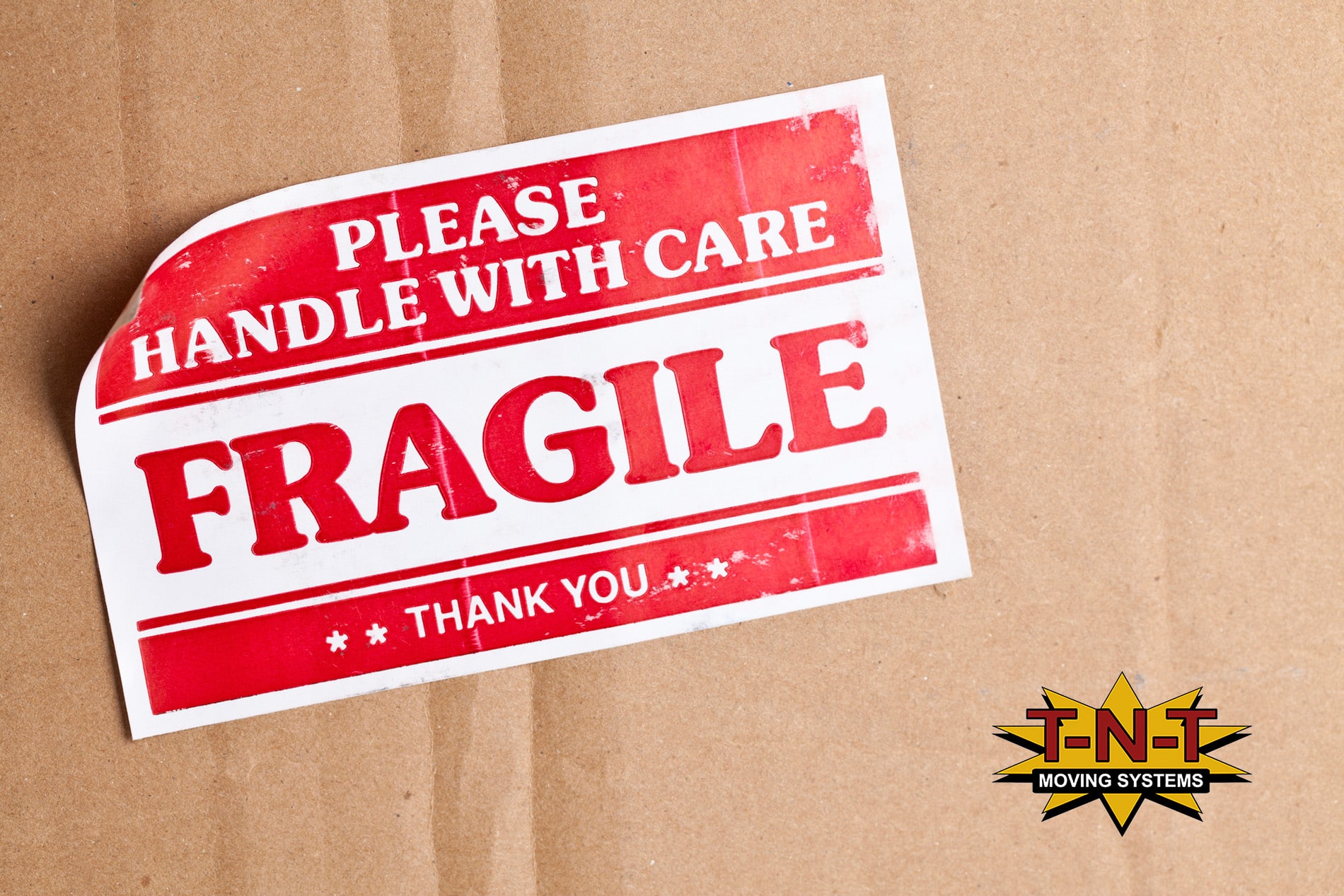Essential Tips for Helping Your College-Bound Kid Move Out

The spring semester will be over before you know it. If your son or daughter is bound for college, chances are you want to help them organize and plan for the big move so they’re not overwhelmed when August arrives.
While a successful relocation requires many steps, you’ll be OK if you abide by this one principle:
The sooner you start preparing, the smoother the experience will be for everyone involved.
Below, TNT Moving Systems provides a timeline for your child’s move. We also discuss how to navigate the emotional side of things and handle their belongings when they return home.
How to Help Your Child Manage the Move
Going away to college is a thrilling, life-changing event for students. But for parents, it can be pretty stressful. Not only is there a lot to organize and plan for, but there’s also the emotional aspect of your child moving out for the first time. Here is a simple timeline of tasks to prepare for to help your child move out smoothly.
Six Weeks From Moving Day
Waiting until the last minute to find your kid an apartment means they will have to settle with whatever is available. And that’s likely to be slim pickings! Six weeks before the move, start researching apartments. Make a list of priorities, and with your budget in mind, narrow your options to three or four.
There are many factors to consider, and whether or not an apartment is suitable for your kid will depend on their specific needs and preferences. All and all, you want them to live in a safe part of town and be within convenient distance to school and other necessities.
Four Weeks From Moving Day
Make arrangements with professional movers in the month leading up to the relocation. If you wait much longer, there may not be any trucks available on moving day. Plus, many logistics are involved when organizing a move, and it’s best for you and the movers to plan early and stay on the same page throughout the process.
TNT Moving Systems thrives on helping people move locally or long-distance. We’ll go out of our way to make the experience as easy and painless as possible!
You’ll also want to start collecting packing supplies (e.g., boxes, tape, packing paper, etc.) during this time. Make a list of materials your child will need, and start looking for deals now to Chaos the stress of last-minute shopping. Moreover, you might consider renting a storage unit so that you can start moving your child’s belongings early and keep everyone’s stress levels down.
Two Weeks From Moving Day
You should have most of your child’s things packed by this point in the moving process. If you’ll be sending furniture and other heavy items, be sure to collect plenty of blankets that you can use to pad the items during transport.
Also, make a list of emergency contacts to keep on hand. Include the apartment landlord or owner, police department, school administrator, and any other essential contacts in your child’s new community.
One Week From Moving Day
If everything goes as planned, you won’t have many responsibilities to handle at this point, and you’ll be able to focus on spending quality time with your kid during their last week at home.
With that said, it wouldn’t hurt to begin transitioning some of their things to the garage. This includes moving boxes, furniture, and anything else they are not putting in the storage unit. Make sure your child packs the rest of their belongings too (e.g., study materials, kitchen items, clothes, etc.).
The Hardest Part: Tips for Saying Goodbye
While handling the logistics of your child’s move will demand time and energy, saying goodbye and helping them prepare for life as an adult can be particularly draining. You want to send your kid off with positive thoughts and emotions, but that doesn’t mean you won’t be sad or worried. They’ve been your world for the last 18-plus years, so it’s natural to be a bit anxious when they take the leap to live independently.
Fortunately, there are plenty of ways to alleviate the stress, embrace the moment, and make the parting process smoother for you and your child:
Leading Up to the Move
Senior year is quite stressful for many students as they deal with the pressure of major decisions, college applications, preparing for independence, and maintaining good grades in the process. Many students find it difficult to deal with the sadness of leaving close family members that have played such a vital role in their upbringing.
Sometimes, this results in feelings of anger and lashing out at the people closest to them. If your child starts acting unusual in the year and months leading up to the relocation, try to have grace and remember it’s not personal.
Arguing and Outbursts
If your teenager seems angrier during this time, it doesn’t mean that they hate you or anyone else in the family. It is simply that they are trying to subconsciously disengage to minimize the pain of moving away. It’s more common for family fights to occur in the few months leading up to a college move-out than at any other stage of child development.
Moreover, try not to receive any labels your child puts on you or your partner as a judgment of your parenting. Remember that it can be easier for a teen to picture college as an exciting and enjoyable experience when they’re not so focused on leaving people behind. And try not to worry if your child suddenly begins expressing strong opinions that clash with yours as they strive for independence. Most often, this is a normal, temporary stage of the separation process.
Patience and Focus
With these factors in mind, try to be extra patient with your teen and focus on the tasks at hand as you help them prepare for college. If fights break out over minor issues, take a deep breath and keep doing what you were doing.
Sticking close to the routines and preparation strategies you’ve established can help to reduce stress and conflict. Put your head down, and keep knocking tasks off of the college to-do list because postponing them won’t do anyone any good.
Drop-Off Day
No matter how much you prepare, expect college move-in day to be somewhat disorganized (and potentially chaotic). Allow your child to take the lead as you drop them off at school with hundreds or thousands of other students.
The last thing your son or daughter wants is for you to make them appear dependent and childish. Remember this if you’re tempted to micromanage every step of the move-in. Sure, you may want to do this or that differently (and you might have a better way of doing it), but keep in mind that your teen is the one who’s beginning a new life in their dorm room or apartment. Let them check in with administrators, get their key card, and handle any other tasks in front of them.
Also, try to keep the attention on your child and what they are thinking and feeling. Whether you are sad, stressed, or even a bit jealous, remember that this is a big step for your teen; they should be able to take it all in.
Furthermore, expect to meet a lot of new people as you help your child get moved into their new school life. But let your teen make introductions. All and all, you’ll be OK if you remember that it’s not your college experience but your child’s. You’re simply there to help them get a smooth start in this exciting new chapter.
After the Drop-Off
In the weeks after you drop your teen off at college, you’ll likely miss them immensely and constantly think about them. But it’s important to give them a bit of space. Don’t worry; your child will miss you eventually, but they are entering adulthood and independence. They will probably be focused on making new experiences and, hopefully, their schoolwork!
It’s common for parents to keep up with their college kids on social media. While there’s nothing wrong with staying in touch, keep in mind that your child will need their own space. Let them make new friends. Allow them to make mistakes. And try to let them figure out solutions to challenges and problems that they face because that is a crucial part of becoming an adult. The ultimate goal is to remain available to advise and console your child while keeping a healthy distance.
Where Should You Put Their Belongings When They Come Home?
It can help to think ahead to when your child returns home from college for the summer. You don’t want to be surprised and have no plan when they bring a carload of belongings with them! Here are a few tips for managing your child’s things when they come home:
Determine What to Keep and Store
Whether your child is transitioning from dorm to apartment or simply wants to live comfortably on their break from school, you will need to figure out what to do with all their stuff. For some families, it makes sense to rent a storage unit. Others have the necessary space to keep the items at home. If you choose to allow your kid to move their things into your house, make sure it doesn’t make life too inconvenient for you; you need your space and organization too!
Regardless of the plan, remind your child that this is an excellent opportunity to declutter and get rid of anything they don’t need or use. Most kids will pack all their stuff as quickly as possible to move on to the next stage in their lives. Encourage your child to assess each item before they put it in a box and take it with them.
Avoid Taking In Dorm Room Items
It’s important to distinguish household items from dorm items when determining what your child should bring home with them. Many parents set ground rules, such as not allowing off-season clothing, books for entertainment, bedding, kitchen appliances, and so forth. Chances are you already have many of the things your child will need to live comfortably, and you don’t want to clutter up your living environment with a bunch of extra stuff.
Also, if your child has school-specific materials they won’t be using until the new semester starts, consider putting them in storage. With that said, make sure your child brings anything they need for summer activities. You don’t want to be making multiple trips to the storage facility over the summer to pick up equipment, clothes, or other items they left behind.
Conclusion
The time has come (perhaps a little faster than you anticipated) for your kid to leave for college. While this is a thrilling start to a new chapter for them, it can be a stressful and emotional experience for you. Try to remember that your teen is embarking on an adventure into adulthood and independence, and even if it doesn’t feel like it right now, they will need your love and support through each step.
Consider the tips above for helping your child move out of the home and into college life, and remember to practice a little more patience as your family navigates this new season. As always, reach out to TNT Moving Systems to make the relocation as easy as possible!




